Chronic Venous Insufficiency Treatment in Irvine, CA
What is Chronic Venous Insufficiency?
Symptoms of Chronic Venous Insufficiency
The severity of CVI and the complexity of treatment increase as the disease progresses. Because of this, it is essential to seek treatment as soon as you start experiencing symptoms.
Common symptoms that you should look out for include:
- Swelling in your lower legs and ankles, especially when you stand for an extended period.
- Tiredness or aching in the legs.
- Having leathery-looking skin on your legs.
- Itching or flaking skin on your feet or legs.
- Edema, which causes swelling of the ankles or legs.
- Pain that worsens when you stand and eases when you raise your legs.
- Throbbing or a feeling of heaviness in your legs.
- Itchy or weak legs.
- Thickening of the skin around your ankles or legs.
- Leg ulcers and a feeling of tightness in your calves.
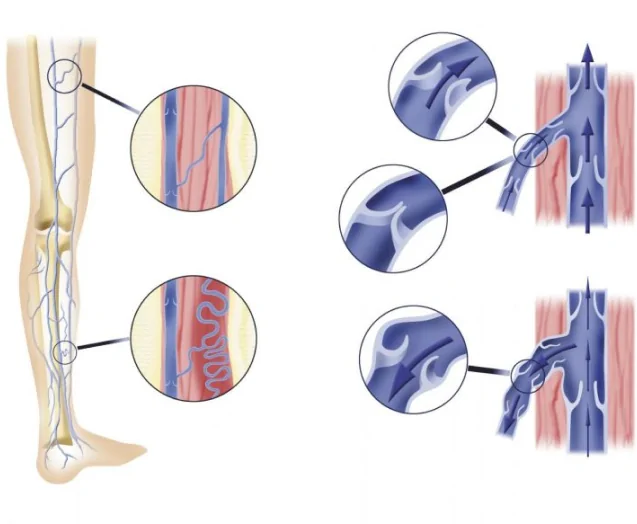
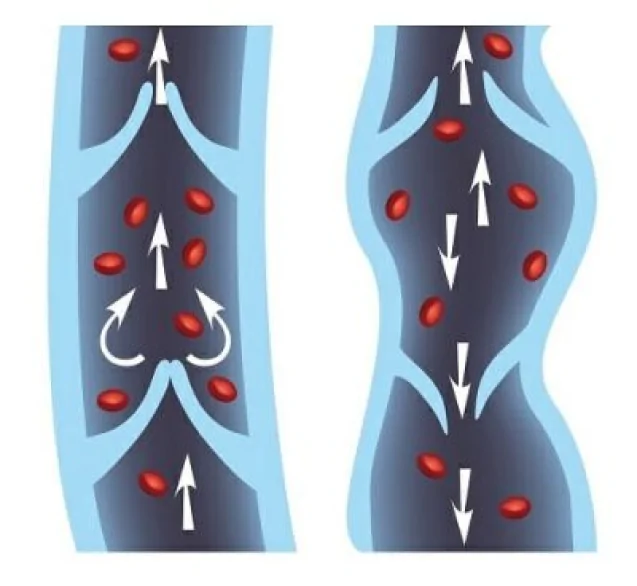
Causes of Chronic Venous Insufficiency
Varicose veins and blood clots are the leading causes of CVI, which disrupt the normal functioning of the veins. Blood clots block the veins, making it hard for the blood to flow. Varicose veins, on the other hand, involve damaged or missing valves within the veins, allowing blood to backflow and pool in the affected veins. In some cases, the leg muscles that help push the blood forward can also weaken, leading to CVI.
- Obesity
- Blood Clots
- Varicose Veins
- Pregnancy
- Cancer
- Smoking
- Muscle Weakness
- Trauma, or Leg Injury
- Phlebitis (swelling of the superficial vein)
- Family History of CVI
- Having to stand or remain seated for an extended period
Diagnosing Chronic Venous Insufficiency
Your doctor will start your diagnostic process by doing a comprehensive physical examination. We will also take your medical history and may order imaging tests to pinpoint the source of your condition. Some of the standard imaging tests for diagnosing CVI include duplex ultrasound and a venogram.
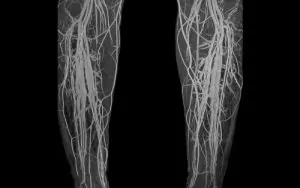 A venogram is a test that enables the doctor to see the veins in the body, especially in the legs. During the procedure, your doctor will inject a special intravenous contrast dye into the veins. The unique contrast dye makes the blood vessels appear opaque on the X-ray image. The image will provide a clear picture of the blood vessels, enabling the doctor to detect abnormalities.
A venogram is a test that enables the doctor to see the veins in the body, especially in the legs. During the procedure, your doctor will inject a special intravenous contrast dye into the veins. The unique contrast dye makes the blood vessels appear opaque on the X-ray image. The image will provide a clear picture of the blood vessels, enabling the doctor to detect abnormalities.
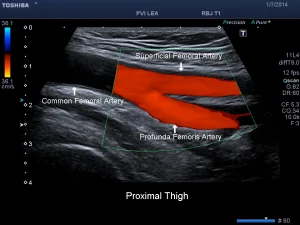 Duplex ultrasound involves high-frequency sound waves to look at the speed and the direction of blood flow in the veins. This test will also show the blood vessel width and reveal any blockages. The test is less invasive, meaning that you will not experience any pain. During the test, the technician will place some gel on the skin and then press a transducer (a small handheld device) against your leg. The device emits sound waves that bounce back to a computer and shows images of how the blood is flowing through your veins.
Duplex ultrasound involves high-frequency sound waves to look at the speed and the direction of blood flow in the veins. This test will also show the blood vessel width and reveal any blockages. The test is less invasive, meaning that you will not experience any pain. During the test, the technician will place some gel on the skin and then press a transducer (a small handheld device) against your leg. The device emits sound waves that bounce back to a computer and shows images of how the blood is flowing through your veins.
When left untreated, CVI can result in pressure building in the veins. The increase in pressure causes the swelling to increase, forcing even the smallest blood vessels (capillaries) to burst. When the capillaries burst, the overlying skin changes color and acquires a reddish-brown color. The skin is also susceptible to being broken if scratched or bumped.
Burst capillaries lead to various conditions. At the very least, they can cause internal tissue inflammation or damage. In severe cases, they can lead to an open sore on the surface of your skin. Even worse, venous stasis ulcers take a long time to heal, making them susceptible to infections. When the infections are not treated, they rapidly spread to the surrounding tissues.
Additionally, CVI is also associated with twisted or enlarged veins close to the skin. While this condition can occur anywhere throughout the body, it often occurs in the legs.
Treatments for Chronic Venous Insufficiency
We understand that every patient is unique. Each of our treatment plans is customized based on the patient’s underlying causes, health status, medical history, specific symptoms, age, how well they tolerate medications or procedures, and the severity of their condition.
In some, more severe cases of chronic vein insufficiency, we offer a range of nonsurgical treatment options. These options are designed to manage your condition effectively, especially in the early stages.
We take care to explain these procedures in depth to every patient, making sure they understand and are comfortable with the proposed course of treatment.
Contact Us Today


Our Board-Certified Vein Doctors

J. Joseph Hewett, M.D.
Vascular Specialist

Neil K. Goldstein, M.D.
Vascular Specialist

Derrick Tran, MD
Vascular Specialist
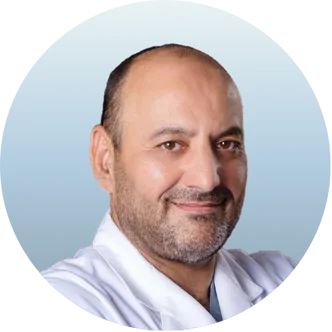
Mohammad Jaber, M.D.
Vascular Specialist
Why Choose Pedes Orange County?
At Pedes Orange County Clinic, you can expect expert assistance and professional treatment from all staff members. We take pride in delivering the best possible outcome by offering high-standard individualized care. With over a decade of experience in this field, we have completed thousands of procedures to treat CVI.
To demonstrate our commitment to offering the best treatment, we have volunteered to participate in various evaluations to ensure our clinic meets and exceeds the national performance in chronic venous insufficiency treatments. Give us a call today to schedule an appointment and get started on getting a solution that meets your specific needs.
We prioritize our patients’ needs. Through our vast experience in this field, we take pride in offering precise treatment that stops the disease from progressing quickly and offers advice on lifestyle changes that prevent the condition from resurfacing.
It is our goal to ensure that you live a happy, healthy life. As such, our patient care does not stop after the end of a procedure in our clinic. We also schedule follow-up appointments to evaluate the recovery and results. Our friendly physicians are also more than happy to help you with any concerns about our diagnostic tests and treatment procedures. Please schedule an appointment today, and we promise to deliver the best possible experience and results.
What to Expect from Your Visit to Pedes
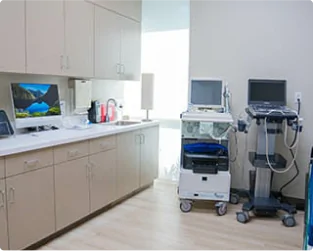
Ultrasound
Advanced ultrasound-guided examination techniques will be used to visualize the veins, arteries, or both, in your legs. This is often used in the diagnostic process to detect the presence and extent of disease.
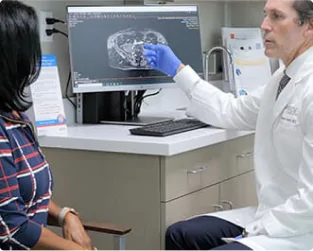
Consult
Once we review the results of your diagnostic tests, our physicians will collaborate with you to develop a personalized treatment plan, ensuring the best course of treatment for your specific condition.
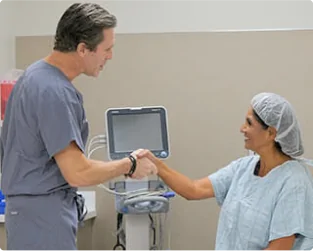
Treatment
Your treatment plan will be personalized to you and your individual needs. At Pedes, we specialize in minimally invasive procedures and nonsurgical treatments, all of which are performed by our dedicated vascular physicians within the comfort of our state-of-the-art facility.




